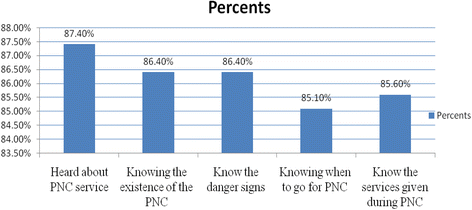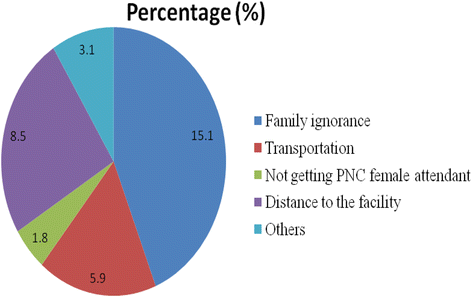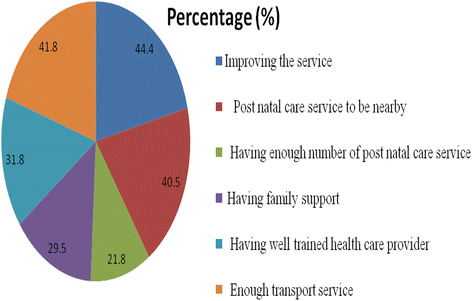Determinants of postnatal care utilization in urban community among women in Debre Birhan Town, Northern Shewa, Ethiopia
- PMID: 29673402
- PMCID: PMC5909206
- DOI: 10.1186/s41043-018-0140-6
Determinants of postnatal care utilization in urban community among women in Debre Birhan Town, Northern Shewa, Ethiopia
Abstract
Background: Reducing maternal mortality and improving maternal health care through increased utilization of postnatal care utilization is a global and local priority. However studies that have been carried out in Ethiopia regarding determinants are limited. So This study aims to assess the magnitude of postnatal care utilization and its determinants in Debre Birhan Town, North Ethiopia.
Methods: A community-based cross-sectional study was conducted from March 1 to April 25, 2015, in Debre Birhan Town. Data were collected through face-to-face interviews using structured pre-tested questionnaires. The data were entered and cleaned in Epi Info version 3.5 and analyzed using SPSS version 20. Bivariate and multiple logistic regression analyses were used. Variable with p value less than or equal to 0.2 at bivariate analysis were entered into multiple logistic regression. Significance was declared at 0.05 in multiple logistic regressions and considered to be an independent factor.
Result: From the total respondents, we found that 327 (83.3%) mothers utilized the postnatal care services. Single mothers were less likely to utilize postnatal care services than those mothers who are married and live together [adjusted odds ratio (AOR) = 0.06, 95% CI (0.01, 0.45)]. This study revealed that respondent's knowledge about postnatal care services is an important predictor of postnatal care utilization [AOR = 0.03, 95% CI (0.00, 0.44)] and mothers who delivered in a health care facility were more likely to receive PNC than mothers who did not deliver in a health care facility [AOR = 0.65, 95% CI (0.58, 0.94)].
Conclusion: The postnatal care utilization rate in Debre Birhan town was 83.3%. Marital status, maternal knowledge, and place of delivery were predictors of postnatal care service utilization. So specific attention should be directed towards the improvement of women's education since the perception of the need for PNC services were positively correlated with the mother's education.
Keywords: Debre Birhan; Determinants; Ethiopia; Postnatal care utilization; Women.
Conflict of interest statement
Ethics approval and consent to participate
Ethical clearance was obtained from the Institutional Review Board of the University of Gondar. Permission was obtained from Debre Birhan Health Office and respective Kebeles. Informed written consent was obtained from each study respondent. Parental guidance letter was obtained for those participants having an age of 18 or less. Each respondent was informed about the objective of the study. They were also informed that all data obtained from them would be kept confidential.
Competing interest
The authors declare that they have no competing interests.
Publisher’s Note
Springer Nature remains neutral with regard to jurisdictional claims in published maps and institutional affiliations.
Figures
Similar articles
-
Utilization of preconception care and associated factors among reproductive age group women in Debre Birhan town, North Shewa, Ethiopia.Reprod Health. 2019 Jul 5;16(1):96. doi: 10.1186/s12978-019-0758-x. Reprod Health. 2019. PMID: 31277717 Free PMC article.
-
Magnitude and determinants for place of postnatal care utilization among mothers who delivered at home in Ethiopia: a multinomial analysis from the 2016 Ethiopian demographic health survey.Reprod Health. 2019 Nov 8;16(1):162. doi: 10.1186/s12978-019-0818-2. Reprod Health. 2019. PMID: 31703696 Free PMC article.
-
Maternal and newborn health services utilization in Jimma Zone, Southwest Ethiopia: a community based cross-sectional study.BMC Pregnancy Childbirth. 2019 May 22;19(1):178. doi: 10.1186/s12884-019-2335-2. BMC Pregnancy Childbirth. 2019. PMID: 31113407 Free PMC article.
-
The effect of antenatal care on use of institutional delivery service and postnatal care in Ethiopia: a systematic review and meta-analysis.BMC Health Serv Res. 2018 Jul 24;18(1):577. doi: 10.1186/s12913-018-3370-9. BMC Health Serv Res. 2018. PMID: 30041655 Free PMC article.
-
Utilization and Determinants of Postnatal Care Services in Ethiopia: A Systematic Review and Meta-Analysis.Ethiop J Health Sci. 2019 Jan;29(1):935-944. doi: 10.4314/ejhs.v29i1.16. Ethiop J Health Sci. 2019. PMID: 30700962 Free PMC article.
Cited by
-
Association between antenatal care utilization pattern and timely initiation of postnatal care checkup: Analysis of 2016 Ethiopian Demographic and Health Survey.PLoS One. 2021 Oct 12;16(10):e0258468. doi: 10.1371/journal.pone.0258468. eCollection 2021. PLoS One. 2021. PMID: 34637481 Free PMC article.
-
Effect of four or more antenatal care visits on facility delivery and early postnatal care services utilization in Uganda: a propensity score matched analysis.BMC Pregnancy Childbirth. 2022 Jan 3;22(1):7. doi: 10.1186/s12884-021-04354-8. BMC Pregnancy Childbirth. 2022. PMID: 34979981 Free PMC article.
-
Utilization of Antenatal Care and Skilled Birth Delivery Services in Sub-Saharan Africa: A Systematic Scoping Review.Int J Environ Res Public Health. 2024 Apr 3;21(4):440. doi: 10.3390/ijerph21040440. Int J Environ Res Public Health. 2024. PMID: 38673351 Free PMC article.
-
Uptake of, barriers and enablers to the utilization of postnatal care services in Thyolo, Malawi.BMC Pregnancy Childbirth. 2023 Apr 19;23(1):271. doi: 10.1186/s12884-023-05587-5. BMC Pregnancy Childbirth. 2023. PMID: 37076801 Free PMC article.
-
Risk factors for women's non-utilization of decentralized primary health care facilities for postnatal care in rural western Ethiopia.Ther Adv Reprod Health. 2020 Jun 26;14:2633494120928340. doi: 10.1177/2633494120928340. eCollection 2020 Jan-Dec. Ther Adv Reprod Health. 2020. PMID: 32637939 Free PMC article.
References
-
- WHO . Postpartum care of the mother and newborn: a practical guide WHO/RHT/MSM/983. Geneva: WHO; 1998.
-
- Lawn J, Kerber K. Opportunity for Africa newborns: practical data, policy and programmatic support for newborn care in Africa. Cape Town: PMNCH; 2006.
Publication types
MeSH terms
LinkOut - more resources
Full Text Sources
Other Literature Sources
Medical
Miscellaneous




